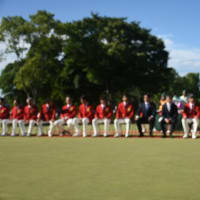『大東亜戦争で日本はいかに世界を変えたか』
加瀬英明著・KKベストセラーズ社刊
第四章 アジア諸民族を鼓舞した気高い精神
古賀 剛大 様
今回は、第四章です。本章では、日本が大東亜戦争中にアジア独立を助け鼓舞した事例が三つ取り上げられています。インパール作戦、インドネシア独立の基盤ペタ(郷土防衛義勇軍)、シアヌーク国王作成の『ボゴールの薔薇』という映画です。
インパール作戦は無謀な作戦の代表例として批判の的にされていますが、インド国民軍(INA)とともに戦ったこの作戦こそが、実はインド独立の決定的な要因となったことを紹介しています。イギリスの著名な歴史家エリック・ホブズボーム・ロンドン大学教授が『極端な時代』の中で、インドの独立が、ガンジー、ネールによる独立運動によるものではなく、インド国民軍ともにインドへ侵攻したインパール作戦によってもたらされた、と述べているそうです。
インドネシアの独立は五年間に亘るオランダ軍との戦いの末に勝ち取られたものですが、その支えとなったのは日本が育てたペタでした。これなしでは日本によって目覚めさせられた独立精神もオランダ軍を打ち破ることは絶対的に不可能でした。インドネシアに残って独立戦争に協力した二千人余りの日本軍兵士の貢献も大きな勝因でした。
シアヌーク国王は『ボゴールの薔薇』という映画を制作されていますが、著者は国王が来日された折にこの映画のビデオをいただたそうです。映画は北朝鮮で作られ、主役の日本軍部隊長長谷川大佐を国王が演じ、モニク妃が大佐の恋人役、日本軍兵士は朝鮮人民軍兵士が演ずるというなかなかユニークなものです。映画の日本軍は規律正しく、民衆が解放者として歓呼して迎えるという内容です。最後に敗戦を迎えた時の大佐のとった行動に気高い精神を感じさせる内容になっているということです。
日本文は、http://hassin.org/01/wp-content/uploads/Greater44.pdf
英文は、http://www.sdh-fact.com/CL/Greater4.pdf
英文は、下記の通り、英文Newsletter で海外に発信しました。
平成28年3月22日 「史実を世界に発信する会」茂木弘道拝
The Greater East Asian War: How Japan Changed The World
By Kase Hideaki
(Published by KK Bestseller in Japanese, 2015)
Chapter 4 – The Noble Spirit Which Inspired the People of Asia
This link is to Chapter 4.
This Chapter details the Battle of Imphal, the Indonesian volunteer army Defenders of the Homeland (PETA) and the "Rose of Bokor" a drama produced by King Sihanouk of Cambodia.
The battle of Imphal has been chastised as a foolhardy battle because numerous soldiers were killed. However, this battle, a joint effort between the Japanese Army and the Indian National Army (INA), actually brought about the independence of India. Eric Hobsbawm was a prominent British professor of history at the University of London. In his magnum opus, a reflection on the twentieth century entitled "The Age of Extremes," Hobsbawm argued that Indian independence was not the work of independence activists like Gandhi and Nehru but rather was sparked by the attack on India by the Indian National Army and the Japanese during the Battle of Imphal.
Indonesian independence was achieved after five years of severe fighting against the Dutch colonialists. It can be said that this would not have been possible without PETA, the Defenders of the Homeland, the Indonesian volunteer army, which had been nurtured by the Japanese Army. Another important factor of Indonesia’s victory over the Netherlands was that nearly 2000 Japanese soldiers joined the Indonesians in support. About half of them died in battle.
King Sihanouk of Cambodia presented the author a video of the film, "Rose of Bokor," when he came to Japan. The film is quite unique. It was made in a Pyongyang film studio. The King plays Colonel Hasegawa Ichiro, a Japanese Army unit leader, and the King's real-life wife Queen Monique appears as Hasegawa's lover, the beautiful daughter of a powerful local man. The movie portrays the Japanese Army as a highly disciplined force. The many Japanese soldiers appearing in the film were members of the North Korean Army, mobilized as extras. When the Japanese Army came to Bokor, cheering crowds greeted them as "liberators". The film conveys the message that, even though Japan was defeated in war, the noble spirit of the Japanese people remained unaltered.
URL: http://www.sdh-fact.com/book-article/652/
PDF: http://www.sdh-fact.com/CL/Greater4.pdf
Author profile: http://www.sdh-fact.com/auther/kase-hideaki/
*For your reference; Chapter 1. Up to the Day Japan Surrendered
http://www.sdh-fact.com/CL/The-Greater1.pdf
Chapter 2. The Trap Laid by the United States
http://www.sdh-fact.com/CL/Greater2.pdf
Chapter 3. The Greater East Asia Conference and the Dream of Racial Equality
http://www.sdh-fact.com/CL/Greater3.pdf
Questions are welcome.
MOTEKI Hiromichi, Acting Chairman
for KASE Hideaki, Chairman
Society for the Dissemination of Historical Fact
Phone: +81-3-3519-4366
Fax: +81-3-3519-4367
Email moteki@sdh-fact.com
URL http://www.sdh-fact.com
Note: Japanese names are rendered surname first in accordance with Japanese custom.


























※コメント投稿者のブログIDはブログ作成者のみに通知されます